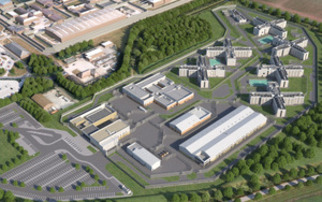
Credit: iStock
Industry Voice: The challenge of climate change requires radical collaboration - between landlords and tenants, but also between tenants, their agents, and the buildings supply chain, explains Derwent London's chief executive Paul Williams
When we think about a traditional commercial landlord and tenant relationship, historically it has been summed up by the notion of 'let and forget'. Ineed, the sector has not always had a reputation for adopting the most customer-focused approach.
But now, more than ever, it is essential to disrupt traditional industry relationships. The challenge of climate change requires radical collaboration - between landlords and tenants, but also between tenants, their agents, the supply chain for buildings, and the local communities around them. None of us can independently move the dial on climate change. We can make our own individual commitments, but we can be much more effective through achieving deeper collaboration with our stakeholders.
What is the scale of the challenge? The built environment contributes around 40 per cent of global carbon emissions. While at Derwent we have set out our own 2030 net zero ambition, 20 years ahead of the pathway set out in the Paris Agreement - the greatest challenge for us and the sector is Scope 3, carbon emissions that we don't directly control ourselves. That brings us all together. So, what needs to change?
First, technology and data are essential. How can we be smarter about our buildings and help the people inside them be smarter? That starts with more data sharing as standard practice, such as on energy use and waste reduction. We are targeting all electric heating and cooling systems for all our new development projects. But we also need to know more around how our occupiers use their space and could be more efficient. In designing a building, we need to consider how people use computers, lights and windows, air conditioning and access their buildings day and night. Intelligent buildings and data on daily use are integral to how we - and our occupiers - can lower energy consumption.
Second, the sector remains highly fragmented in how it responds to this challenge. There will be inefficiencies if everyone thinks about this in a silo, employing their own sustainability experts and models, rather than reaching out to learn from best practice - from organisations like RIBA, in its report ‘Built for the Environment', or from engineering companies like ARUP that are experimenting with 'work unbound' and how to rethink the relationship between offices and staff post Covid. There needs to be more convening across our sector, with multiple stakeholders.
Finally, there needs to be demand from occupiers for more sustainable buildings and operations. A 2021 report from RICS and the World Built Environment Forum showed demand is moving in the right direction, but needs to move faster to hit global targets.
Property agents have a critical role in ensuring the sector is not stuck in the past, focused on short-term metrics of rent costs and square feet rather than asking prospective occupiers: what sort of long-term relationship do you really want with your landlord?
Paul Williams is chief executive at property investment and development firm Derwent London.
This article is sponsored by Derwent London.






